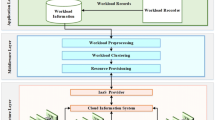Abstract
With the recent advancements in Internet-based computing models, the usage of cloud-based applications to facilitate daily activities is significantly increasing and is expected to grow further. Since the submitted workloads by users to use the cloud-based applications are different in terms of quality of service (QoS) metrics, it requires the analysis and identification of these heterogeneous cloud workloads to provide an efficient resource provisioning solution as one of the challenging issues to be addressed. In this study, we present an efficient resource provisioning solution using metaheuristic-based clustering mechanism to analyze cloud workloads. The proposed workload clustering approach used a combination of the genetic algorithm and fuzzy C-means technique to find similar clusters according to the user’s QoS requirements. Then, we used a gray wolf optimizer technique to make an appropriate scaling decision to provide the cloud resources for serving of cloud workloads. Besides, we design an extended framework to show interaction between users, cloud providers, and resource provisioning broker in the workload clustering process. The simulation results obtained under real workloads indicate that the proposed approach is efficient in terms of CPU utilization, elasticity, and the response time compared with the other approaches.














Similar content being viewed by others
References
Buyya R, Vecchiola C, Selvi ST (2013) Mastering cloud computing: foundations and applications programming. In: Newnes
Chandrasekaran K (2014) Essentials of cloud computing. CRC Press, Boca Raton
Ghobaei-Arani M, Khorsand R, Ramezanpour M (2019) An autonomous resource provisioning framework for massively multiplayer online games in cloud environment. J Netw Comput Appl 142:76–97
Manvi SS, Shyam GK (2014) Resource management for Infrastructure as a Service (IaaS) in cloud computing: a survey. J Netw Comput Appl 41:424–440
Shahidinejad A, Ghobaei-Arani M, Esmaeili L (2019) An elastic controller using Colored Petri Nets in cloud computing environment. Cluster Comput 1–27. https://doi.org/10.1007/s10586-019-02972-8
Iqbal W, Erradi A, Mahmood A (2018) Dynamic workload patterns prediction for proactive auto-scaling of web applications. J Netw Comput Appl 124:94–107
Singh S, Chana I (2015) Q-aware: Quality of service based cloud resource provisioning. Comput Electr Eng 47:138–160
Wang X, Wang H (2020) Driving behavior clustering for hazardous material transportation based on genetic fuzzy C-means algorithm. IEEE Access 8:11289–11296
Mirjalili S, Saremi S, Mirjalili SM, Coelho LDS (2016) Multi-objective grey wolf optimizer: a novel algorithm for multi-criterion optimization. Expert Syst Appl 47:106–119
Gill SS, Buyya R (2019) Resource provisioning based scheduling framework for execution of heterogeneous and clustered workloads in clouds: from fundamental to autonomic offering. J Grid Comput 17(3):385–417
Erradi A, Iqbal W, Mahmood A, Bouguettaya A (2019) Web application resource requirements estimation based on the workload latent features. IEEE Trans Services Comput. https://doi.org/10.1109/TSC.2019.2918776
Xu L, Wang H, Lin W, Gulliver TA, Le KN (2019) GWO-BP neural network based OP performance prediction for mobile multiuser communication networks. IEEE Access 7:152690–152700
Xu L, Wang J, Wang H, Gulliver TA, Le KN (2019) BP neural network-based ABEP performance prediction for mobile Internet of Things communication systems. Neural Comput Appl 1–17. https://doi.org/10.1007/s00521-019-04604-z
Xu Y-H, Xie J-W, Zhang Y-G, Hua M, Zhou W (2020) Reinforcement Learning (RL)-based energy efficient resource allocation for energy harvesting-powered wireless body area network. Sensors 20(1):44
Xu YH, Liu ML, Xie JW, Zhou J (2019) An IEEE 802.21 MIS-based mobility management for D2D communications over heterogeneous networks (HetNets). Concurr Comput Pract Exp 32:5. https://doi.org/10.1002/cpe.5552
Gill SS, Buyya R, Chana I, Singh M, Abraham A (2018) BULLET: particle swarm optimization based scheduling technique for provisioned cloud resources. J Netw Syst Manag 26(2):361–400
Mian R, Martin P, Vazquez-Poletti JL (2013) Provisioning data analytic workloads in a cloud. Fut Gener Comput Syst 29(6):1452–1458
Magalhães D, Calheiros RN, Buyya R, Gomes DG (2015) Workload modeling for resource usage analysis and simulation in cloud computing. Comput Electr Eng 47:69–81
Amiri M, Mohammad-Khanli L, Mirandola R (2018) An online learning model based on episode mining for workload prediction in cloud. Fut Gener Comput Syst 87:83–101
Meenakshi A, Sirmathi H, Ruth JA (2019) Cloud computing-based resource provisioning using k-means clustering and GWO prioritization. Soft Comput 23(21):10781–10791
Raza B et al (2018) Autonomic workload performance tuning in large-scale data repositories. Knowl Inf Syst 1–37. https://doi.org/10.1007/s10115-018-1272-0
Liu C, Liu C, Shang Y, Chen S, Cheng B, Chen J (2017) An adaptive prediction approach based on workload pattern discrimination in the cloud. J Netw Comput Appl 80:35–44
Singh P, Gupta P, Jyoti K (2018) TASM: technocrat ARIMA and SVR model for workload prediction of web applications in cloud. Clust Comput 22(2):619–633
Calheiros RN, Ranjan R, Beloglazov A, De Rose CA, Buyya R (2011) CloudSim: a toolkit for modeling and simulation of cloud computing environments and evaluation of resource provisioning algorithms. Softw Pract Exp 41(1):23–50
Author information
Authors and Affiliations
Corresponding author
Additional information
Publisher's Note
Springer Nature remains neutral with regard to jurisdictional claims in published maps and institutional affiliations.
Rights and permissions
About this article
Cite this article
Ghobaei-Arani, M., Shahidinejad, A. An efficient resource provisioning approach for analyzing cloud workloads: a metaheuristic-based clustering approach. J Supercomput 77, 711–750 (2021). https://doi.org/10.1007/s11227-020-03296-w
Published:
Issue Date:
DOI: https://doi.org/10.1007/s11227-020-03296-w




